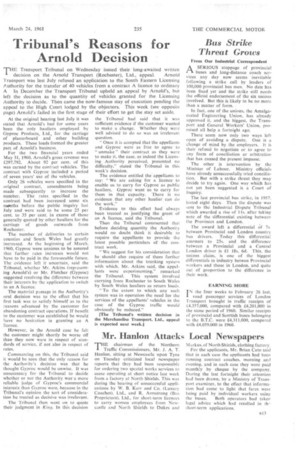Tribunal's Reasons for Arnold Decision
Page 47

If you've noticed an error in this article please click here to report it so we can fix it.
THE Transport Tribunal on Wednesday issued their long-awaited written . decision on the Arnold Transport (Rochester), Ltd., appeal. Arnold Transport was last July refused an application to the South Eastern Licensing Authority for the transfer of 40 vehicles from a contract A licence to ordinary A In December the Transport Tribunal upheld an appeal by Arnold's, but left the decision as to the quantity of vehicles, granted for the Licensing Authority to decide. Then came the now-famous stay of execution pending the appeal' to the High Court lodged by the objectors. •This week (see opposite page) Arnold's failed in the first stage of their effort to get the stay set aside.
At the original hearing last July it was stated that Arnold's had for some years been the only hauliers employed by Gyproc Products, Ltd., for the carriage of plasterboard and other building products. These loads formed the greater part of Arnold's business.
For the two financial years ended May 31, 1960. Arnold's gross revenue was £297,792. About 92 per cent. of this was earned by the contract vehicles. The contract with Gyproc included a period of seven years' use of the vehicles.
Only 26 vehicles were specified in the original contract, amendments being made subsequently to increase the number. The rates specified in the contract had been increased some six months before the public inquiry .last July and were said to be some 25 per cent. to 35 per cent. in excess of those generally quoted by other hauliers for the carriage of goads outwards from Rochester.
Thel number of deliveries, to certain counties and South Wales had greatly increased. At the beginning of March, 1960, Gyproc were anxious to be assured that further rates increases would not have to be paid in the foreseeable future. The evidence left it uncertain, said the Tribunal, whether Mr. Atkins (representing Arnold's) or Mr. Fletcher (Gyproc) suggested resolving the difference between their interests by the application to switch to an A licence. .
The material passage in the Authority's oral decision was to the effect that his first task was to satisfy himself as to the reasons advanced by the customer for abandoning contract operations. If benefit to the customer was established he would have no hesitation in granting an A licence.
However, in the Arnold case he felt the customer might shortly be worse off than they now were in respect of standards of service, if not also in respect of rates.
Commenting on this, the Tribunal said it would be seen that the only reason for the Authority's decision was that he thought Gyproc would he unwise. It was unnecessary for the Tribunal to decide whether or not the Authority was'a more reliable judge of Gyproc's commercial interests than Gyproc were, because in the Tribunal's opinion the sort of consideration he treated as decisive was irrelevant.
The Tribunal then went on to quote their judgment in King. In this decision
the Tribunal had said that it was sufficient evidence if the customer wanted to make a change. Whether they were well advised to do so was an irrelevant question.
"Once it is accepted that the appellants and Gyproc were as free to agree to " unmake " their contract as they were to make it, the case, as indeed the Licensing. Authority perceived, presented no difficulty," stated the Tribunal in this week's decision.
The evidence entitled the appellants to say: We are asking for a licence to enable us to carry for Gyproc as public hauliers. Gyproc want us to carry for them in that capacity. There is no evidence. that any other haulier. can do the work."
Evidenee to this effect had always been treated as justifying the grant of an A licence, said the Tribunal.
Then the Tribunal commented that before deciding quantity . the Authority would no doubt think it desirable to require the appellants to provide the latest possible particulars of the contract work.
"We suggest for his consideration that he should also require of them further information about the trunking system with which, Mr. Atkins said, the appellants were experimenting," remarked the Tribunal. This system involved carrying from Rochester to South Wales by South Wales hauliers as return loads.
"To the extent to which any such system was in operation the need for the services of the appellants' vehicles in the case of the Gyproc traffic would obviously he reduced."
[The Tribunal's written decision in the Merchandise Transport, Ltd., appeal is expected next week.1




































































































































